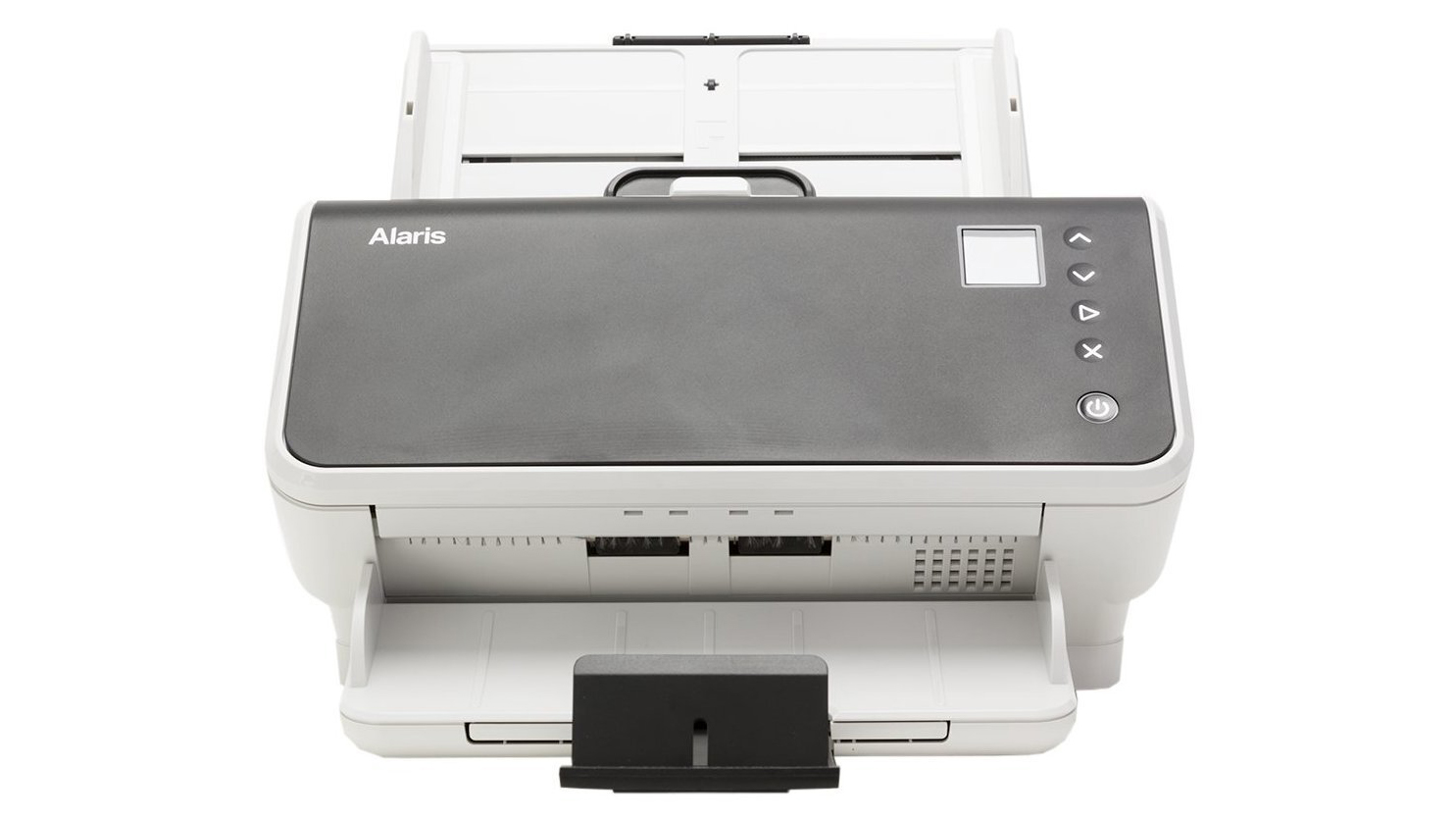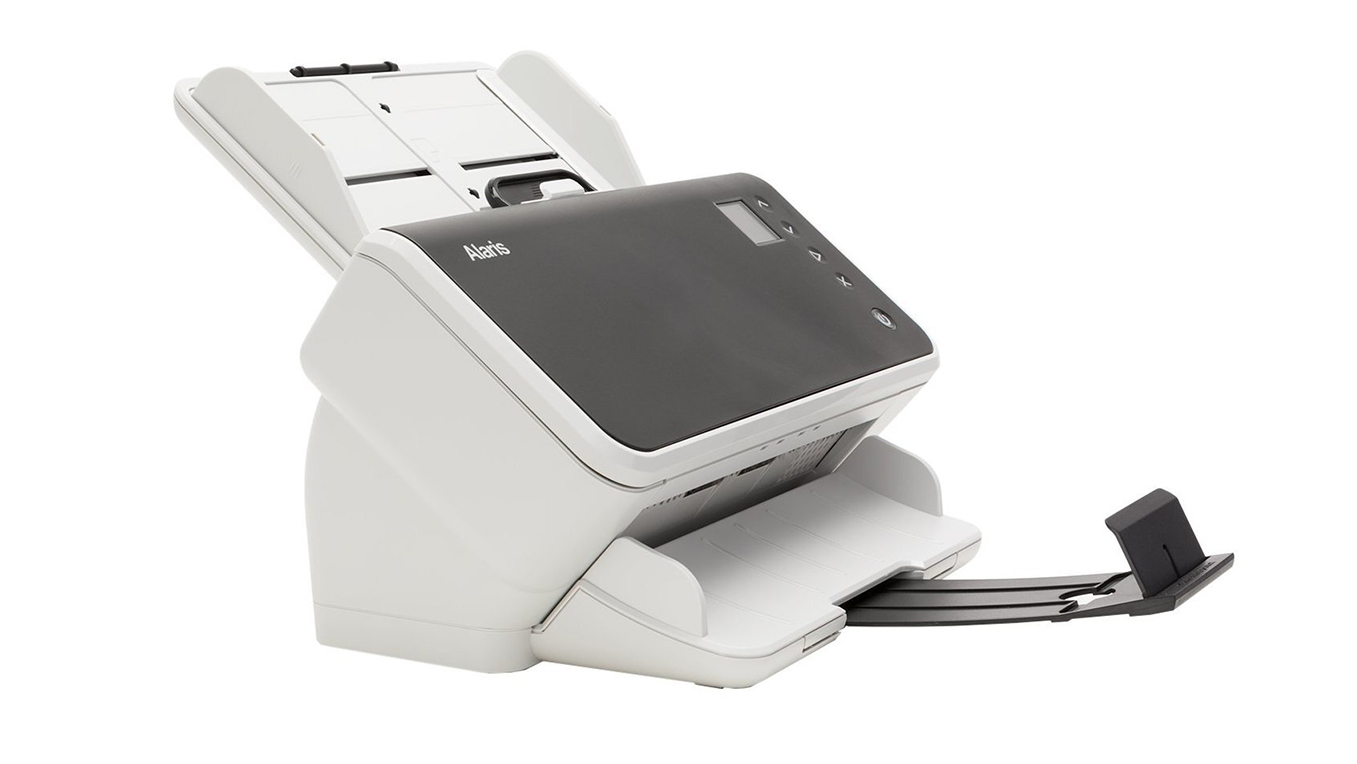Kodak Alaris S2040 review: Clunky yet funky
This speedy USB-only scanner benefits from onboard processing and produces great results


-
+
Impeccable paper handling
-
+
Suitable for larger workloads
-
+
Doesn’t need a high-end PC to host it
-
+
Good selection of output formats
-
-
Complicated installation process
-
-
ADF doesn’t fit passports
-
-
Doesn’t support Dropbox and OneDrive

The Kodak Alaris S2040 doesn’t do networking – we’re talking USB connections only. Even so, you don’t need to dedicate a high-end PC to hosting it: it has its own powerful onboard CPU, which handles image processing and enhancement internally, so you can drive it from a lightweight desktop with minimal hardware specs.
It’s a speedy operator too, claiming 40ppm at 300dpi in both colour and mono, while a big 5,000-page daily duty cycle means it won’t baulk at major digitising projects.
Although the specs are good, the installation process could be slicker: the CD supplied in the box was two years old, so we opted to retrieve the most recent software from the Kodak Alaris website. This was a pain, as each item had to be individually selected and downloaded, and for some components we also had to provide the scanner’s serial number and enter registration details.
At the end of the process, though, you’re left with a decent software bundle. The Smart Touch tool allows you to define scan profiles for quick, consistent operations, which can be triggered directly from its colour LCD panel. Nine profiles are predefined to get you started, but up to 20 can be presented in the scanner’s screen menu, and creating new ones is easy.
You can set options such as colour, greyscale or monochrome scanning, resolution and document type, with advanced controls including document size detection, punch-hole filling, anti-skew, blank page skipping and file separation when barcodes are identified.
Output formats are plentiful too: Smart Touch can export scans in searchable PDF format or PNG, JPEG, TIFF, and BMP image formats – or it will do its best to convert them into Word, Excel or RTF documents.
As for destinations, your options include local and networked folders, printers, faxes, custom applications, email – either via the host’s client app or directly through an SMTP server – and SharePoint servers. There are also options to scan straight to Box, Evernote and Google Drive; we had no problem connecting the software to our Evernote account, and appreciated the option of putting a time limit on access, ranging from one day to a year. Dropbox and OneDrive aren’t directly supported, but you can create profiles that scan to their local sync folders on the host PC.
Sign up today and you will receive a free copy of our Future Focus 2025 report - the leading guidance on AI, cybersecurity and other IT challenges as per 700+ senior executives
If you crave more advanced tools, turn to the bundled Capture Pro Limited Edition software, which adds enhanced batch-scanning options, document indexing using barcodes, and basic image processing. It lacks many features of the full edition, though, such as exception processing to check for missing signatures or other required details: pricing starts at around £158 for a year-long subscription.

While we’re on the subject, another extra you might choose to invest in is the flatbed accessory, which sits under the main unit and connects to its USB port. Not everyone will need this, but it’s a must for passport scanning, as passports are too thick to go through the ADF.
The S2040 delivered the goods in our lab tests, digitising a pile of 30 bank statements at an impressive 42.5ppm in both greyscale and colour modes, and at both 200pdi and 300dpi. As usual, speed plummeted at 600dpi, with greyscale and colour scans completing at 9.7ppm and 5.2ppm respectively, but you’ll probably never need to use that mode. The results we saw at 200dpi were more than adequate for archiving, with very clear text and impressively accurate OCR for searching. Paper handling was impeccable too, with the S2040 working through our stacks of statements, flimsy courier tear-offs and till receipts without any jams.
The out-of-box experience may be clunky, but if you’re looking for a USB-only scanner then the Kodak Alaris S2040 is a very tempting option. It offers great performance, it can cope with big workloads, and you don’t need a high-end PC to host it.
Kodak Alaris S2040 specifications
| Format | 600dpi A4 colour scanner |
| Scan speed | 40ppm at 300dpi mono/colour |
| Display | 1.5in colour LCD screen |
| Connectivity | USB 3.2, USB 2 host, External PSU |
| Scan type | Simplex/duplex |
| ADF | 80-page |
| Recommended monthly duty cycle | 5,000 pages per day |
| Bundled software | Alaris Smart Touch and Capture Pro LE |
| Dimensions | 312 x 204 x 183mm (WDH, closed) |
| Weight | 3.3kg |
| Warranty | 3yr advanced replacement warranty |
| Options (exc VAT) | Flatbed scanner accessory, £310 exc VAT |
Dave is an IT consultant and freelance journalist specialising in hands-on reviews of computer networking products covering all market sectors from small businesses to enterprises. Founder of Binary Testing Ltd – the UK’s premier independent network testing laboratory - Dave has over 45 years of experience in the IT industry.
Dave has produced many thousands of in-depth business networking product reviews from his lab which have been reproduced globally. Writing for ITPro and its sister title, PC Pro, he covers all areas of business IT infrastructure, including servers, storage, network security, data protection, cloud, infrastructure and services.
-
 Hackers are using LLMs to generate malicious JavaScript in real time – and they’re going after web browsers
Hackers are using LLMs to generate malicious JavaScript in real time – and they’re going after web browsersNews Defenders advised to use runtime behavioral analysis to detect and block malicious activity at the point of execution, directly within the browser
By Emma Woollacott Published
-
 AI coding is taking off in the US – but developers in another country are “catching up fast”
AI coding is taking off in the US – but developers in another country are “catching up fast”News Developers in the United States are leading the world in AI coding practices, at least for now
By Nicole Kobie Published
-
 Veeam ramps up growth plans with trio of leadership hires
Veeam ramps up growth plans with trio of leadership hiresNews The data resilience vendor has reshaped its senior leadership team to deepen partner engagement and streamline customer success in the AI era
By Daniel Todd Published
